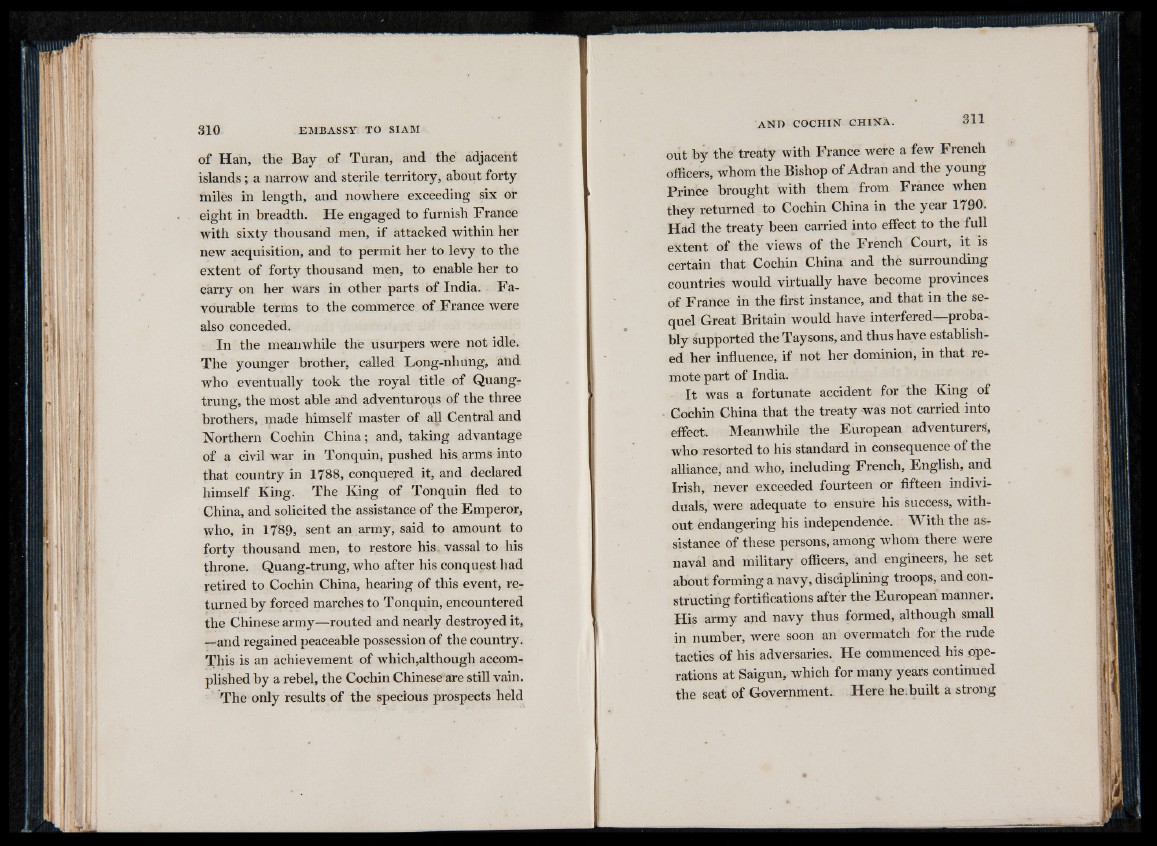
of Han, the Bay of Turan, and the adjacent
islands; a narrow and sterile territory, about forty
miles in length, and nowhere exceeding six or
eight in breadth. He engaged to furnish France
with sixty thousand men, if attacked within her
new acquisition, and to permit her to levy to the
extent of forty thousand men, to enable her to
carry on her wars in other parts of India. Favourable
terms to the commerce of France were
also conceded.
In the meanwhile the usurpers were not idle.
The younger brother, called Long-nhung, and
who eventually took the royal title of Quangr
trung, the most able and adventurous of the three
brothers, made himself master of all Central and
Northern Cochin China; and, taking advantage
of a civil war in Tonquin, pushed his arms into
that country in 1788, conquered it, and declared
himself King. The King of Tonquin fled to
China, and solicited the assistance of the Emperor,
who, in 1789, sent an army, said to amount to
forty thousand men, to restore his. vassal to his
throne. Quang-trung, who after his conquest had
yetired to Cochin China, hearing of this event, returned
by forced marches to Tonquin, encountered
the Chinese army—routed and nearly destroyed it,
—and regained peaceable possession of the country.
This is an achievement of which,although accomplished
by a rebel, the Cochin Chinese are still vain.
The only results of the specious prospects held
out by the treaty with France were a few French
officers, whom the Bishop of Adran and the young
Prince brought with them from France when
they returned to Cochin China in the year 1790.
Had the treaty been carried into effect to the full
extent of the views of the French Court, it is
certain that Cochin China and the surrounding
countries would virtually have become provinces
of France in the first instance, and that in the sequel
Great Britain would have interfered—probably
supported the Taysons, and thus have established
her influence, if not her dominion, in that remote
part of India.
It was a fortunate accident for the King of
Cochin China that the treaty was not carried into
effect. Meanwhile the European adventurers,
who .resorted to his standard in consequence of the
alliance, and who, including French, English, and
Irish, never exceeded fourteen or fifteen individuals,
were adequate to ensure his success, without
endangering his independence. With the assistance
of these persons, among whom there were
naval and military officers, and engineers, he set
about forming a navy, disciplining troops, and constructing
fortifications after the European manner.
His army and navy thus formed, although small
in number, were soon an overmatch for the rude
tactics of his adversaries. He commenced his .operations
at Saigun, which for many years continued
the seat of Government- Here he. built a strong